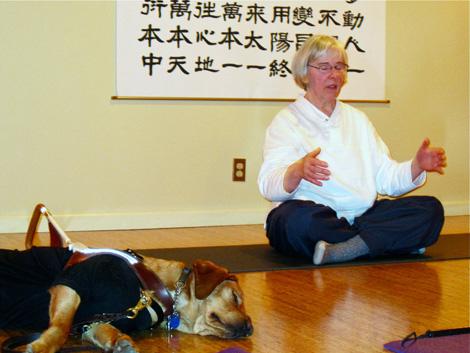Burien woman teaches yoga for the blind
Guide dog Harley overdoes his 'downward facing dog' pose as he joins a yoga class for the blind/visually-impaired taught by Burien resident Bonnie Taschler.
Mon, 05/02/2011
Burien resident Bonnie Taschler is an accomplished yoga instructor. Students attend her weekly, 90-minute class and receive detailed instruction in addition to hands-on help.
Her students are unwaveringly attentive -- except for Harley who frequently naps. However, when he is needed, he jumps to his feet -- all four of them. Harley is a guide dog and also a regular attendee of the yoga class for the blind and visually impaired that Taschler founded in January.
"When you do something and it really makes a difference in your life, you want to share that with someone else if you can," says Taschler, who began practicing Dahn yoga in 2003 and teaching it in 2007.
While discussing outreach opportunities with a colleague last year, Taschler realized that the blind and visually-impaired community was under served. She jumped at the chance to help.
"There was nothing that had drawn me to the blind community before," says Taschler. "However, I am thrilled to be learning in this way."
After pursuing numerous options, Taschler contacted Vision Loss Connections, a Puget Sound non-profit that facilitates opportunities for the visually impaired. Within a week, Vision Loss had 10 prospective students, only one of whom had prior yoga experience. Taschler had two months to develop a curriculum.
The first class was held January 10 at Dahn Yoga at the Harbor Steps in Seattle. Now in its third, six-week session, all classes are free to participants. The space is donated and individuals from the Dahn organization, Vision Loss Connections and Taschler all volunteer their time. Students range in age from 40 to 70 years old and travel from as far as Kent.
Taschler also teaches a sighted class at the Burien Community Center and says that the structure for the visually impaired is largely the same. Communication is the challenge.
"In a sighted class, often you demonstrate things and people can see what you're doing," says Taschler.
For the visually impaired, Taschler worked to hone her descriptions. She estimates that 85 percent of instruction is verbal and 15 percent is kinesthetic -- hands-on teaching. A retired speech and humanities instructor, she practiced on her sighted husband who precisely followed her instructions.
"I had to work with somebody who would give me a hard time," she laughs.
"Sometimes I still misspeak and they (her students) start laughing," she says. "I'm always working to make the verbal component sharper, but I discovered that it's really not that important to them."
Wendy O'Reilly has attended the class since February, along with Harley, her guide dog. "I feel so welcomed and understood. I feel like a whole person again," says O'Reilly.
O'Reilly enjoyed 20/20 vision for most of her life until 10 years ago when a genetic condition, rod-cone dystrophy, began impairing her sight. She now only sees outlines of large objects.
"Thanks to the class, I have regained a sense of belonging that I was missing," she says.
Students also report physical benefits. With an emphasis on stretching and relaxation, O'Reilly has found it easier to cope with her rheumatoid arthritis -- a particular benefit when spending time with her five grandchildren.
"I haven't felt this way in years," she says. "I want to jump up and down and cheer!"
That level of enthusiasm does not surprise Taschler. "There isn't one of them who brings anything but joy to the experience," she says. "The communication is two ways. They've l
earned from me and I've learned from them."
Looking forward to her 70th birthday, Taschler plans to continue teaching and is excited by the prospect of expanding visually impaired yoga classes to other areas.
"I am so grateful to Bonnie that she thought of this," says O'Reilly. "She is making a difference in life."
As the students gather in their customary circle at the end of class, holding hands and joyfully jumping in the air, Harley is on his feet, tail wagging and woofing his approval, too.


